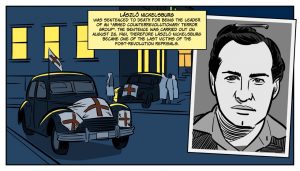Nickelsburg: the freedom fighter who would be one of the last victims of the reprisals
László Nickelsburg was born in Budapest in 1924. He lost his father at a young age and was raised by his mother under difficult circumstances along with his three older brothers. After completing school, he became a machinist. Drafted into a labor squad in 1944, Nickelsburg escaped and spent the rest of the war in hiding. It was only after the war that he learned that his mother and brothers had been deported by the Nazis and had perished.
Following the war, Nickelsburg resumed work as a machinist, receiving recognition as a Stakhanovite lead worker, and he even joined the Communist Party in 1953, around which time he also married and his first child was born. He did everything in his power as a young worker to fit in with the expectations of the communist social system, nonetheless he lost his faith in the system under the dictatorship and became opposed to the system.
On October 31, 1956, he joined the revolutionary group located at Baross Square (near the Keleti Train Station) and quite soon this 32-year-old worker became the group’s leader. His companions nicknamed him “Niki” and considered him an able and energetic leader who always emphasized that the purity of the revolution must be upheld. After the revolution’s initial victory, he participated in the organization of the national guard and became its location captain.
With the Soviet invasion of November 4th, he saw further armed conflict as futile and went over to the nearby Péterfy Hospital to assist the injured. On November 6th, while evacuating the injured an explosion tore his eardrum and his leg was struck by shrapnel, consequently he was confined to bed with a high fever for days. Nickelsburg continued his planning activities by making sure that the fighters would have enough food, but he limited his participation to political resistance and the preparation of resistance fliers.
Nickelsburg escaped to Austria in early December from where he continued his resistance planning, but soon after he returned home and to his job. Arrested in February 1957, he denied all of the charges and since there was a shortage of evidence, his trial dragged out until 1961.
At the end of his lengthy trial and detention, Nickelsburg was sentenced to death on July 15th, 1961 for being the leader of an “armed counterrevolutionary terror group”. The sentence was carried out August 26, 1961, therefore László Nickelsburg became one of the last victims of the post-revolution reprisals.
Ajtony Virágh

